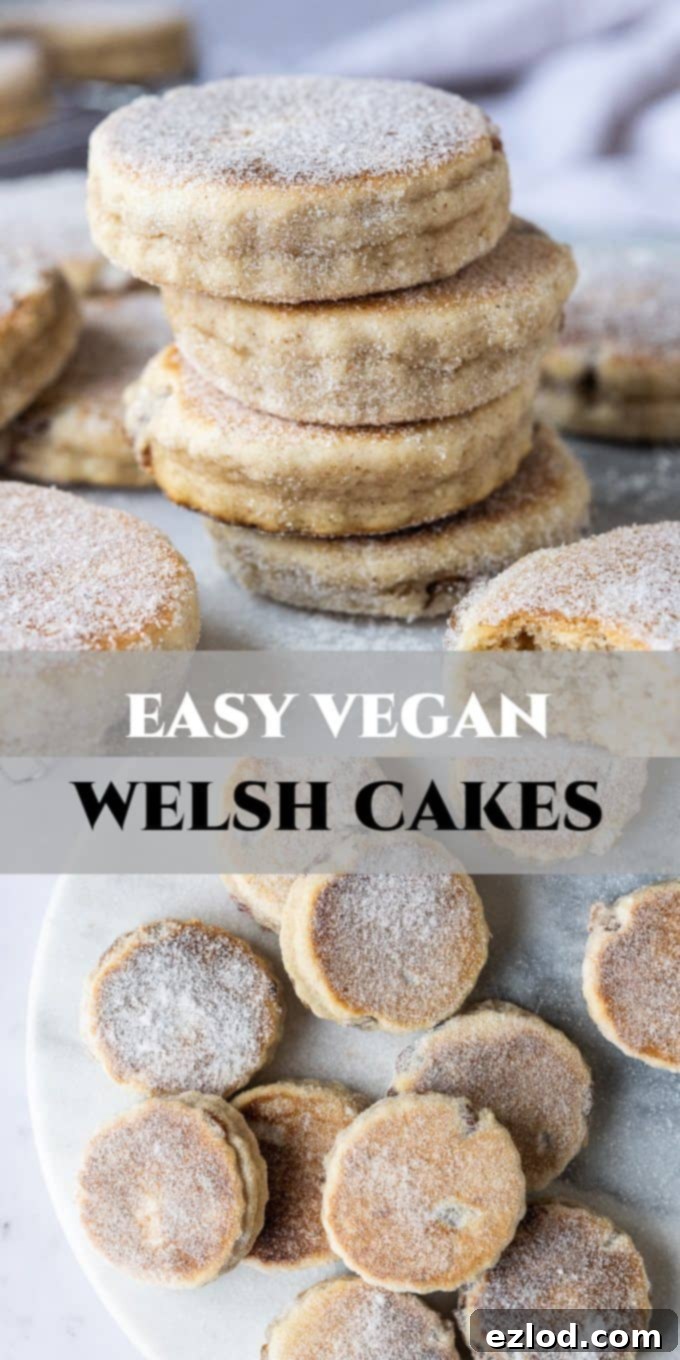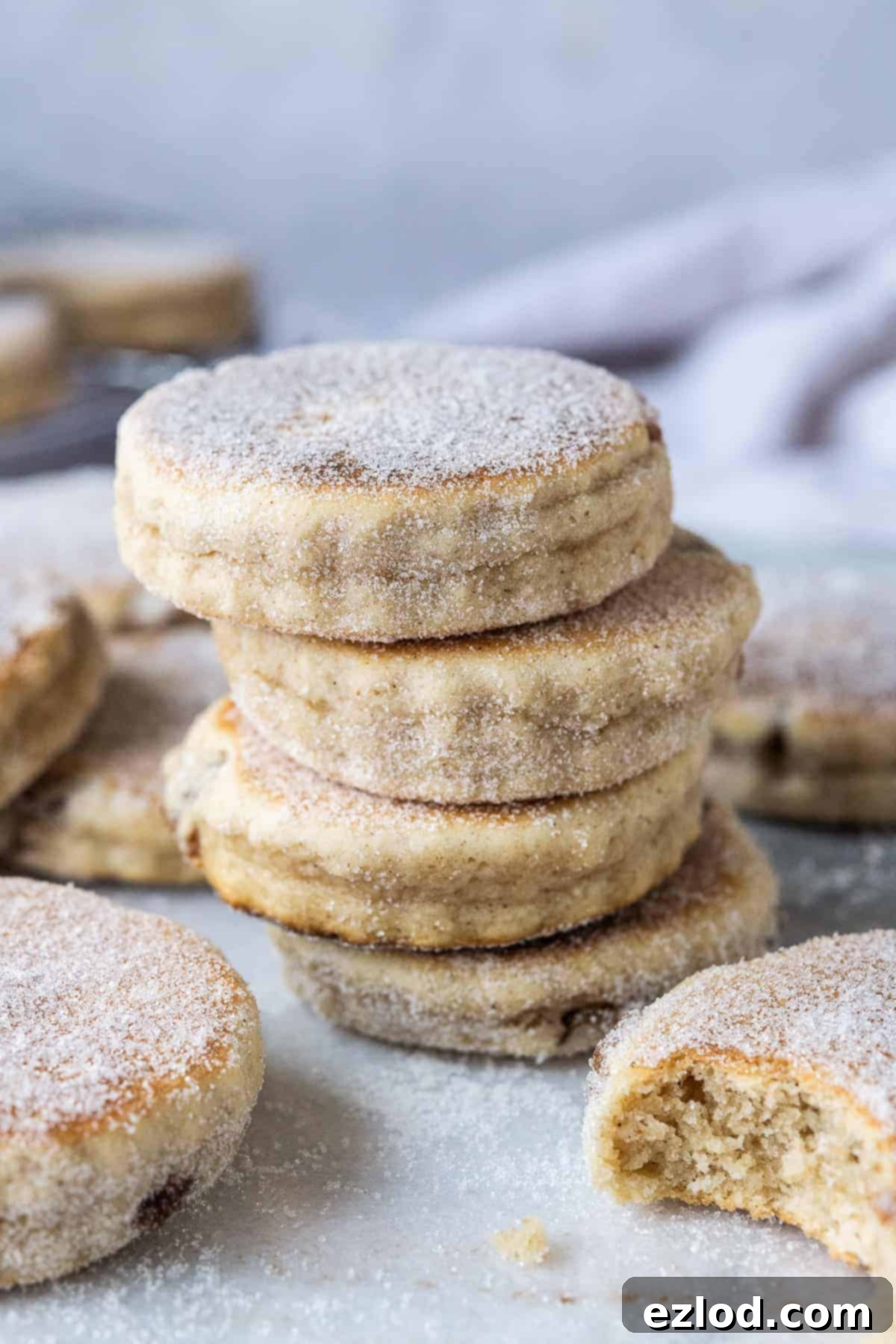Delicious Vegan Welsh Cakes: Easy, Dairy-Free & Eggless Recipe
This delightful vegan version of the classic Welsh treat is every bit as good as the original, offering a quick and simple way to enjoy a traditional favorite. These eggless and dairy-free Welsh cakes are wonderfully moist, delicately spiced, generously studded with dried fruit, and make an absolutely perfect snack for any time of day.
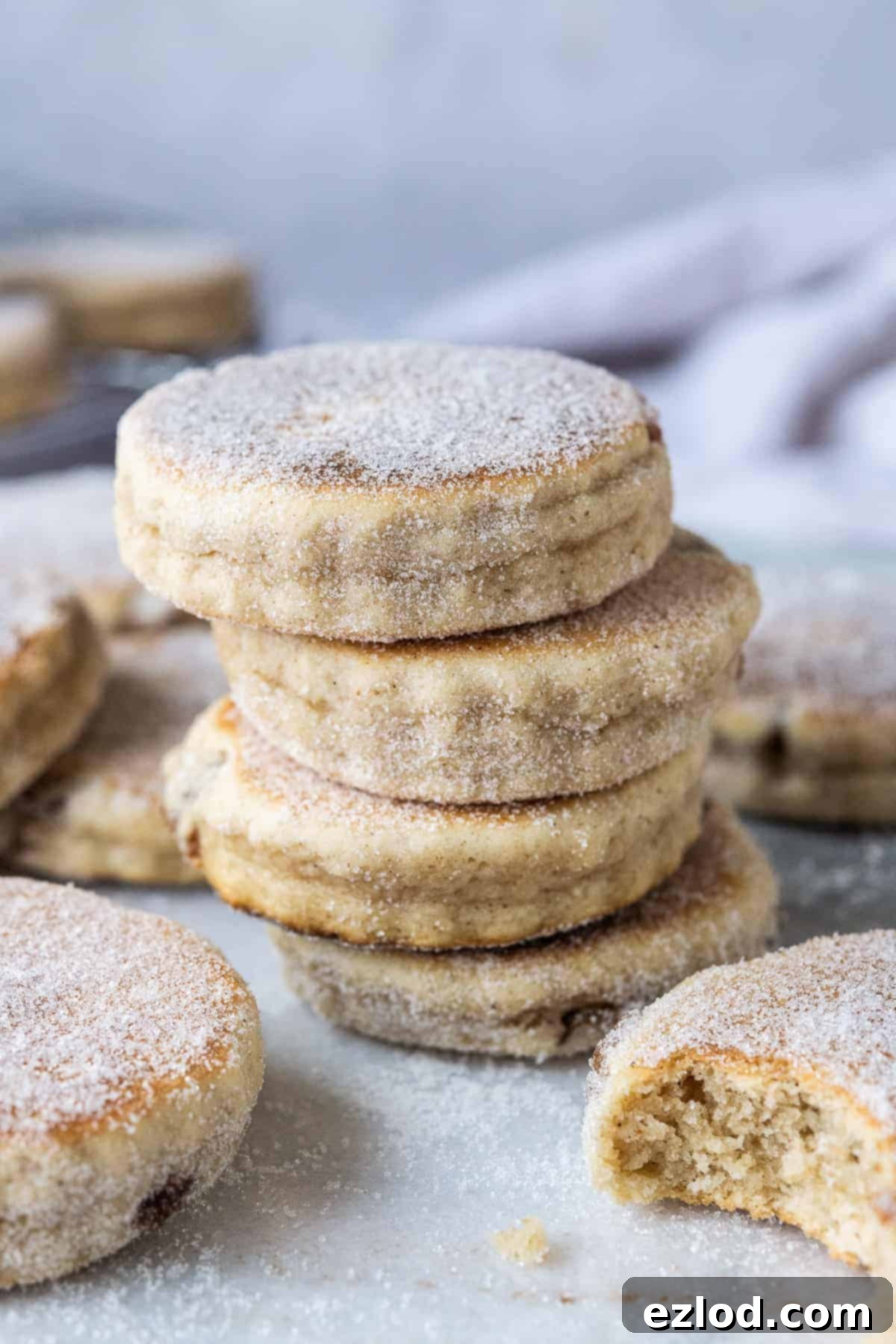
Welsh cakes hold a special place in my heart as one of my all-time favorite traditional treats. Growing up, our frequent family holidays to the beautiful landscapes of Wales always involved consuming countless dozens of these incredibly addictive little griddle cakes. The taste of them instantly transports me back to those cherished childhood memories.
It became clear that it was high time to create a vegan version, ensuring that I, and others with dietary preferences, could continue to enjoy this beloved holiday snack. The goal was simple: achieve the same delicious flavor and crumbly, moist texture without any animal products. And I’m thrilled to say, these vegan Welsh cakes deliver!
What Are Welsh Cakes? A Traditional Welsh Delicacy
Welsh cakes, known locally as “picau ar y maen” or sometimes referred to as “bakestones” or “griddle cakes,” have been a popular fixture in Welsh culinary tradition since the late 19th century. They are distinguishable from scones by their flatter shape and their traditional cooking method on a cast iron griddle or “bakestone,” rather than being baked in an oven. This cooking process gives them a unique, slightly crisp exterior while maintaining a tender and moist interior.
Imagine a delightful cross between a scone and a pancake – but with its own distinct charm. Unlike a scone, Welsh cakes are typically denser, more crumbly, and often have a richer, buttery (or in our case, vegan buttery) texture. They are almost always studded with dried fruits like currants or sultanas and finished with a generous dusting of caster sugar, which adds a subtle sweetness and a pleasant textural contrast.
Traditionally, Welsh cakes are crafted from a handful of simple ingredients: self-raising flour (or plain flour with baking powder), caster sugar, butter, mixed spice, egg, and dried fruits. The beauty of this recipe lies in its simplicity, making it surprisingly easy to adapt for a plant-based diet without sacrificing any of its original deliciousness.
Why Choose Vegan Welsh Cakes?
Creating a vegan version of a classic like Welsh cakes opens up this wonderful treat to an even wider audience. Whether you follow a fully plant-based diet, have dairy or egg allergies, or simply want to explore more ethical and sustainable options, these vegan Welsh cakes are a fantastic choice. The transition to plant-based ingredients is remarkably straightforward for this particular recipe:
- Dairy-Free: The butter, a key component, is easily replaced with a high-quality vegan block butter or margarine. These plant-based alternatives perfectly mimic the richness and texture of dairy butter, ensuring your Welsh cakes remain incredibly tender and flavorful.
- Eggless: Eggs in traditional Welsh cakes primarily act as a binder and add richness. In our vegan recipe, a simple splash of non-dairy milk performs the binding action, and the rich vegan butter ensures the desired texture and taste are maintained. There’s no need for complicated egg substitutes!
- Accessible to All: This recipe means everyone can enjoy the comforting taste of homemade Welsh cakes, making them perfect for sharing at gatherings, family events, or simply as a special treat for yourself.
- Just as Delicious: Perhaps the most important reason! These vegan Welsh cakes prove that you don’t need animal products to achieve a truly delicious, authentic flavor and texture. They are still moist, lightly spiced, and bursting with fruity goodness.
Essential Ingredients for Your Vegan Welsh Cakes
Crafting the perfect batch of vegan Welsh cakes begins with understanding the role of each ingredient and selecting the right plant-based alternatives. Here’s a closer look at what you’ll need:
- Self-Raising Flour: This is the foundation of your Welsh cakes. Self-raising flour already contains a leavening agent, ensuring a light and airy texture. If you only have plain (all-purpose) flour, simply add 1 teaspoon of baking powder for every 225g of flour to achieve the same effect.
- Mixed Spice (or Pumpkin Spice): This blend of warming spices is what gives Welsh cakes their characteristic comforting aroma and flavor. It typically includes cinnamon, nutmeg, and allspice. If you can’t find ‘mixed spice,’ a good quality pumpkin spice blend can be a suitable alternative.
- Vegan Block Butter or Margarine: This is a crucial swap. For the best results and a truly authentic crumbly texture, it’s vital to use a firm, block-style vegan butter or margarine, rather than the softer, spreadable kind that comes in a tub. Spreadable margarines often have a higher water content, which can alter the dough’s consistency. Brands like Naturli Vegan Block, Stork block, Vitalite block, or Tormor block are excellent choices in the UK. In the US, Earth Balance Buttery Sticks are a great option. For an alternative, solid coconut oil can be used, but note that the flavor will be slightly different, and you’ll need to use a bit less (around 85 grams instead of 110) due to its different fat composition.
- Caster Sugar (Superfine Sugar): Caster sugar provides sweetness within the cake and is also essential for dusting the warm Welsh cakes at the end. Its fine texture dissolves easily, contributing to the smooth dough.
- Sultanas or Currants: These traditional dried fruits add bursts of sweetness and chewiness to every bite. You can stick to the classic sultanas or currants, or experiment with other finely chopped dried fruits like raisins, cranberries, or even apricots, if you prefer.
- Non-Dairy Milk: A small amount of non-dairy milk is used to bind the dough. Any unsweetened variety will work well, such as almond, soy, or oat milk. The key is to add it gradually to achieve a soft but not sticky dough consistency.

How To Make The Best Vegan Welsh Cakes: A Detailed Step-by-Step Guide
Making these vegan Welsh cakes is a truly enjoyable process. Follow these detailed steps for perfect results every time:
1. Prepare Your Dry Ingredients
In a large mixing bowl, combine the self-raising flour and mixed spice. If you are using plain flour instead of self-raising, now is the time to add your baking powder. Give it a good stir with a whisk or spoon to ensure the leavening agent and spice are evenly distributed throughout the flour. This initial step prevents pockets of plain flour or clumps of spice in your final cakes.
2. Incorporate the Vegan Butter
Add the cold, cubed vegan block butter to the flour mixture. Using your fingertips, gently rub the butter into the flour. The goal is to break down the butter into very small pieces and coat them with flour until the mixture resembles fine breadcrumbs. It’s important that no large lumps of fat remain, as this ensures an even, crumbly texture. Keep your hands cool during this process to prevent the butter from melting.
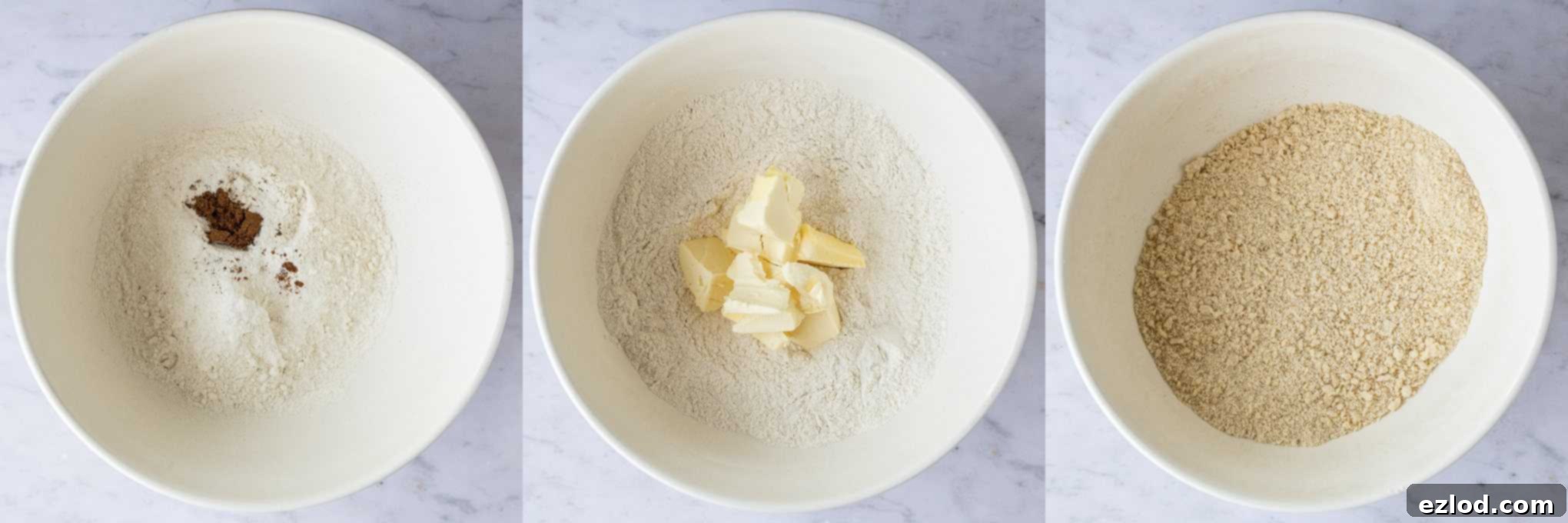
3. Add Sugar and Dried Fruit
Stir in the caster sugar and your chosen dried fruits (sultanas or currants) into the breadcrumb mixture. Mix thoroughly so that the sugar and fruit are well distributed. This ensures every bite of your Welsh cake will have a delightful sweetness and chewiness.
4. Form the Dough
Gradually pour in the non-dairy milk, a tablespoon at a time, and stir with a spoon or your hand to bring the mixture together. The dough should come together into a soft, pliable ball. Be cautious not to add too much liquid; the dough should be soft but not sticky. Over-mixing can develop the gluten in the flour, leading to tough Welsh cakes, so mix just enough until it forms a cohesive dough. Avoid kneading.
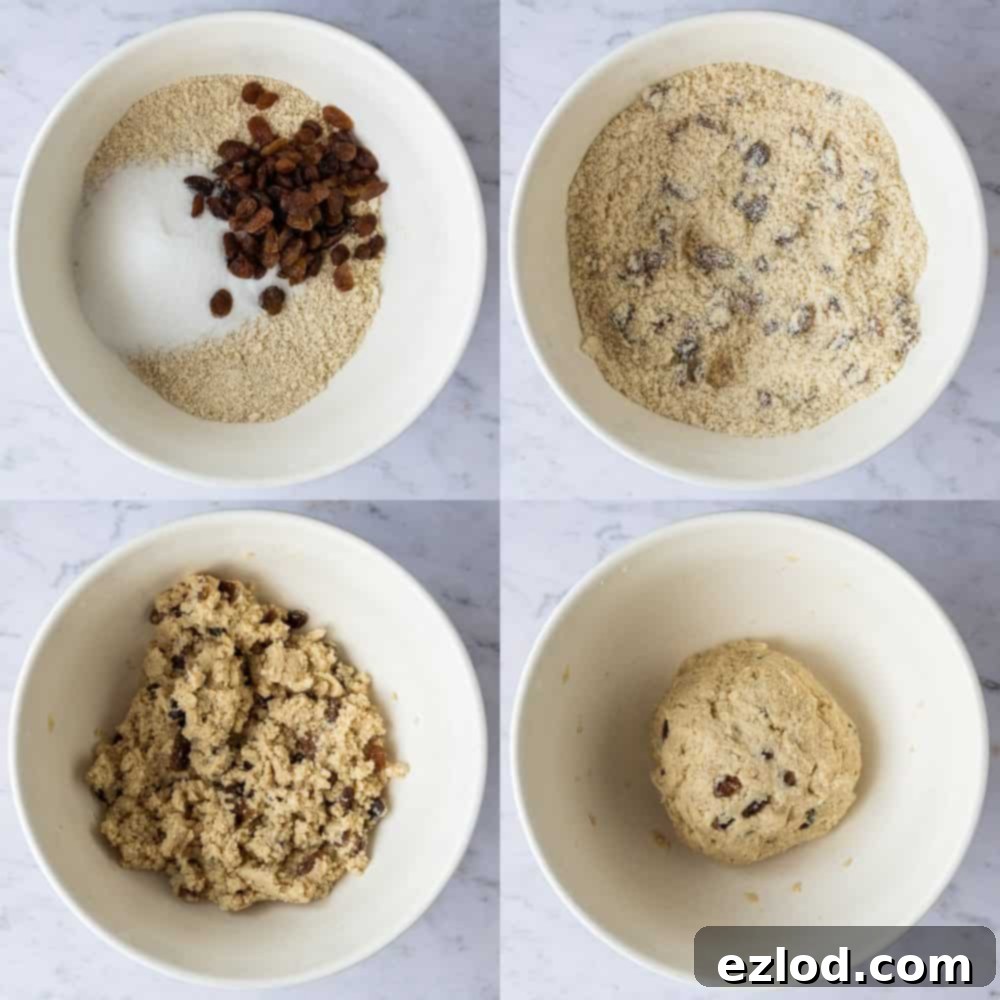
5. Roll and Cut the Cakes
Lightly flour a clean work surface and place your dough on it. Roll out the dough using a rolling pin until it is about 5mm (or ¼ inch) thick. Using a 6.5cm (2 ½ inch) to 7.5cm (3 inch) fluted or plain round cutter, cut out as many rounds as possible. Gently bring the dough scraps together, re-roll, and cut out more rounds until all the dough is used.
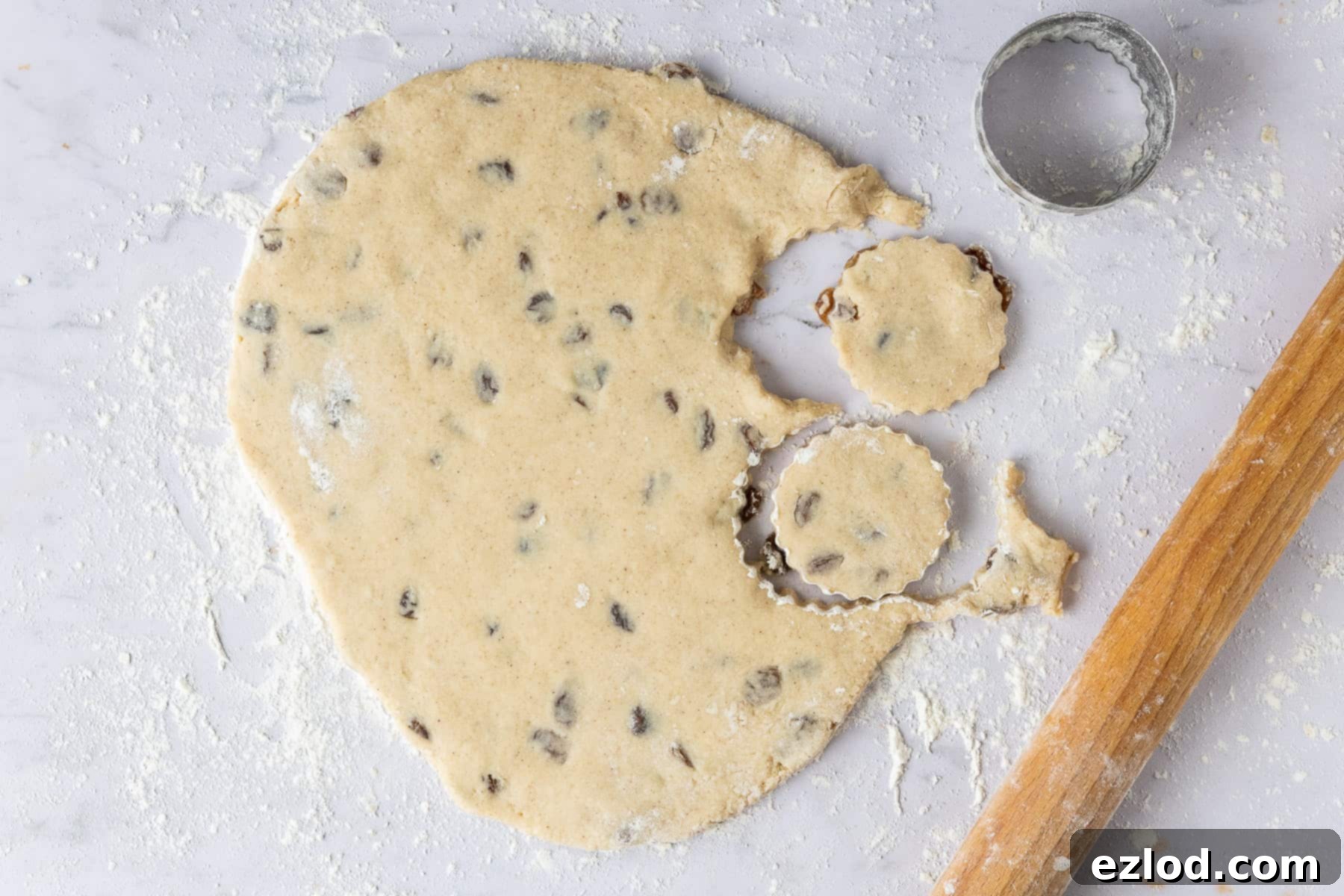
6. Prepare for Cooking
Place a cast iron griddle or a heavy-bottomed frying pan over a low to medium heat. The right temperature is crucial, so allow it to heat up gradually. Brush the surface of the pan with a small amount of vegan butter to prevent sticking. Prepare a bowl with extra caster sugar for dusting the cooked cakes.
7. Cook the Welsh Cakes
Carefully place a few Welsh cakes at a time onto the heated griddle, ensuring they have enough space. Cook them for about 3 minutes on the first side, or until they are golden brown and cooked through. Then, using a spatula, carefully flip them over and cook for another 3 minutes on the second side, until both sides are golden and the cakes are cooked through. They will firm up further as they cool. Remember to keep a close eye on them; they can go from perfectly golden to burnt very quickly!
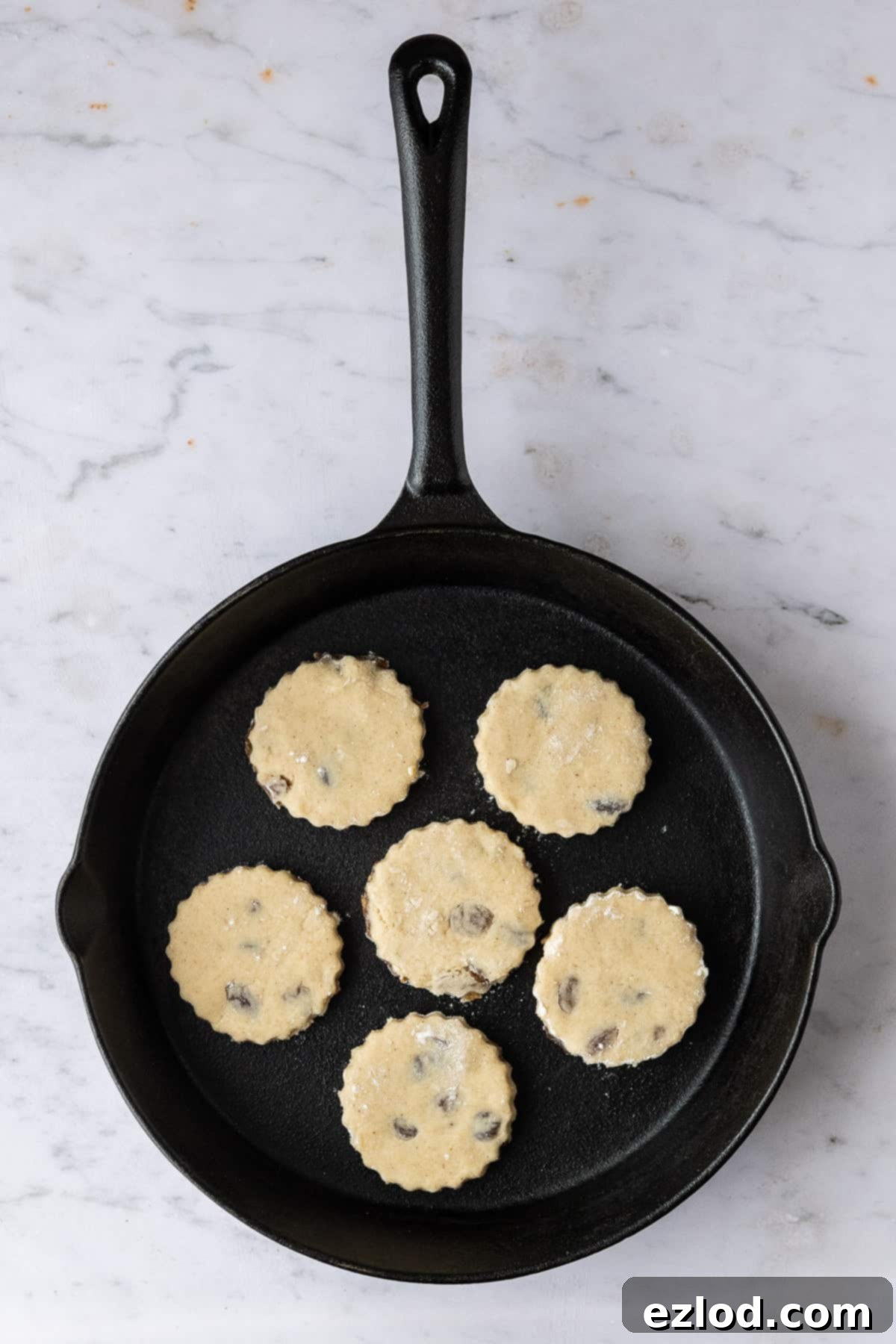
It can be a little tricky to get the griddle temperature exactly right on your first try. A great tip is to cook a “test cake” first. This allows you to adjust the heat as needed before cooking the entire batch, ensuring consistency.
8. Dust with Sugar
As soon as the Welsh cakes are cooked and removed from the griddle, while they are still hot, roll them gently in the bowl of caster sugar. The heat helps the sugar adhere and creates a beautiful, sweet coating. Repeat this process with the remaining cakes as you cook them.
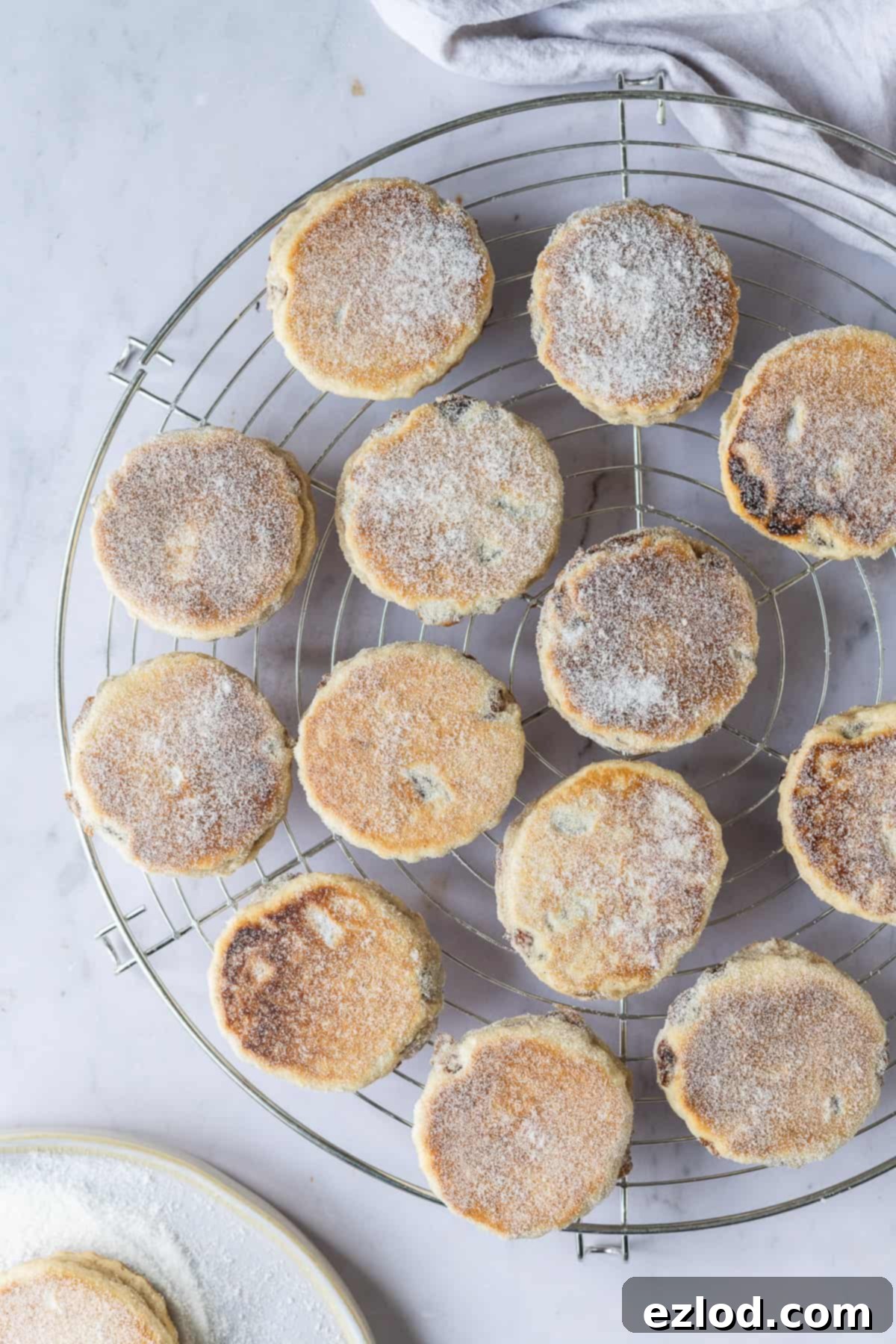
Expert Tips for Perfect Vegan Welsh Cakes
Achieving consistently delicious vegan Welsh cakes is easy with a few key tips:
- Measure Accurately: For the best baking results, especially with pastry-like doughs, always use gram measurements with a digital scale rather than cup conversions. Cup measurements can be inconsistent and impact the final texture of your Welsh cakes.
- Use Cold Block Butter: The vegan butter should be cold and cubed when you rub it into the flour. This prevents it from melting too quickly and creates pockets of steam during cooking, which results in a lighter, more crumbly texture. Avoid using spreadable margarines from tubs as they have a higher water content and can make your dough sticky.
- Don’t Overwork the Dough: Mix the dough just enough for it to come together into a smooth ball. Overworking (or kneading) the dough will develop the gluten, making your Welsh cakes tough and less tender.
- Master the Pan Temperature: This is arguably the most critical step. The griddle or frying pan needs to be hot enough to cook the cakes through and achieve a golden-brown exterior, but not so hot that they burn on the outside before cooking in the middle. It often takes a little experimentation with your stove and pan to find the perfect medium-low heat setting. As mentioned, cooking a ‘test’ cake or two first is highly recommended.
- Don’t Rush the Cooking: While they cook relatively quickly, ensure each side gets its full 3 minutes (or until golden brown and cooked through). Rushing can lead to undercooked centers or burnt exteriors.
- Roll While Hot: Dusting the Welsh cakes with caster sugar immediately after they come off the griddle ensures the sugar melts slightly and adheres beautifully, creating that signature sweet finish.
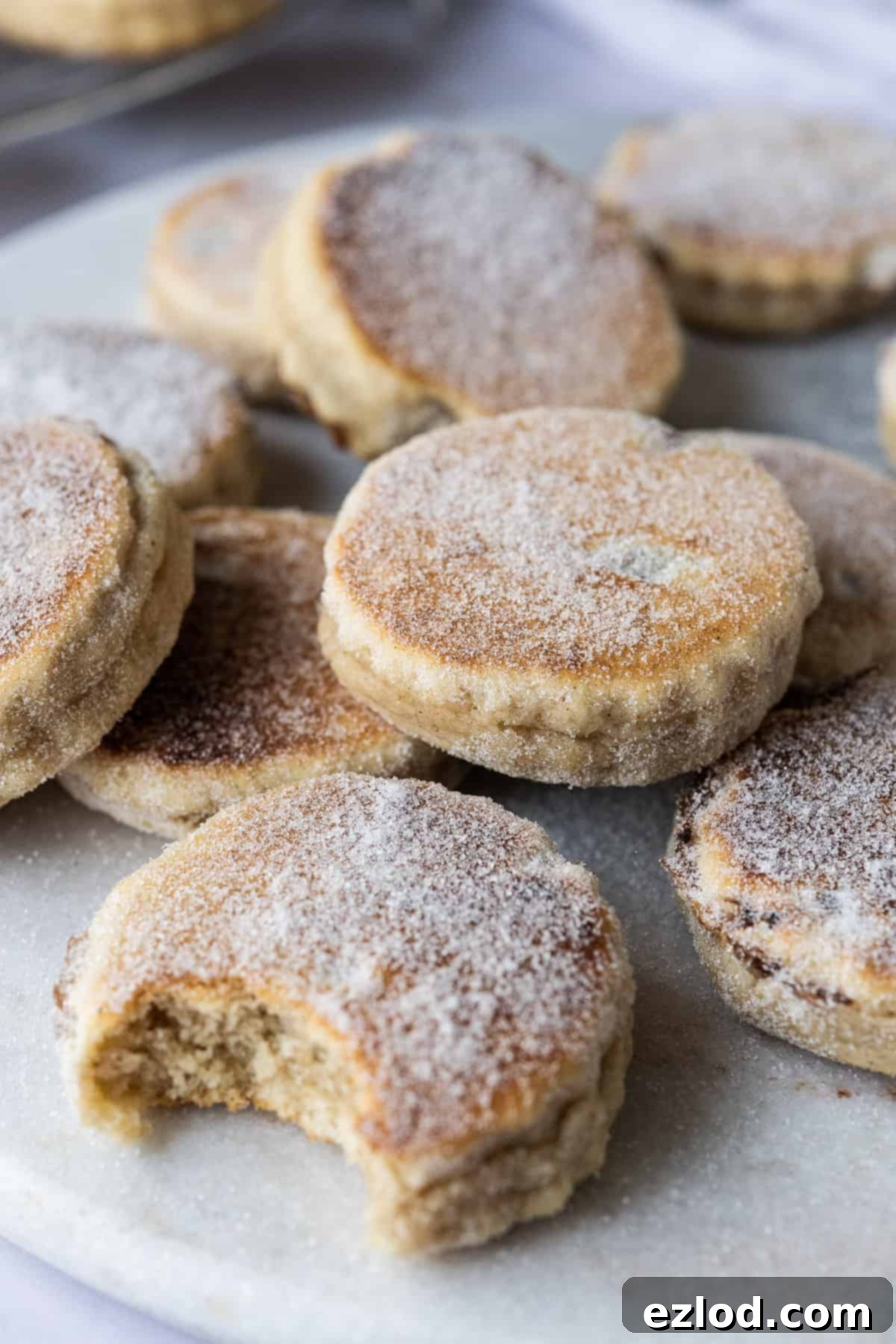
Serving Suggestions for Your Vegan Welsh Cakes
Vegan Welsh cakes are incredibly versatile and delicious in many ways:
- Plain and Warm: Enjoy them straight off the griddle, still warm from the dusting of sugar. Their simple, spiced flavor shines through beautifully.
- With Vegan Butter & Jam: For a more indulgent treat, split them open and spread with a generous dollop of vegan butter and your favorite fruit jam or preserve.
- The Perfect Companion to Tea: Traditionally, Welsh cakes are a quintessential afternoon treat, best enjoyed with a steaming cup of tea or coffee.
- Breakfast or Brunch: Serve them as part of a leisurely breakfast or brunch spread alongside fresh fruit and other plant-based delights.
Storing and Freezing Vegan Welsh Cakes
Planning ahead or want to save some for later? Here’s how to store your vegan Welsh cakes:
How To Store Vegan Welsh Cakes:
Once your vegan Welsh cakes have completely cooled, transfer them to an airtight container. They will keep well at room temperature for 4-5 days. While they are best enjoyed fresh, their delightful texture and flavor hold up wonderfully for several days.
Can I Freeze Them?:
Absolutely! These vegan Welsh cakes freeze exceptionally well, making them ideal for meal prep or having a quick snack on hand. For optimal freshness, it’s best to freeze them on the same day they are made, ensuring they are completely cool beforehand. Place them in a freezer-safe container or a sturdy ziplock bag, making sure to remove as much air as possible to prevent freezer burn. They can be frozen for up to 3 months.
To enjoy frozen Welsh cakes, simply take them out to defrost at room temperature for a few hours. Once defrosted, you can refresh them briefly in a toaster, a dry frying pan over a low heat, or even a microwave for a few seconds until warmed through. This helps to restore their tender interior and slightly crisp exterior.
Frequently Asked Questions (FAQs)
Here are answers to some common questions you might have when making vegan Welsh cakes:
- Can I use different dried fruits? Yes! While sultanas and currants are traditional, feel free to experiment with other finely chopped dried fruits like raisins, chopped apricots, or even cranberries for a different flavor profile.
- What if I don’t have mixed spice? If mixed spice isn’t available, you can create your own blend. A good substitute would be a mix of cinnamon, nutmeg, and a pinch of allspice. Pumpkin spice blend can also work well as a direct alternative.
- My Welsh cakes turned out tough, what went wrong? This is usually a sign of overworking the dough. Too much mixing or kneading develops the gluten, resulting in a dense, tough texture. Next time, mix just until the dough comes together.
- My Welsh cakes burned quickly on the outside. The pan temperature was likely too high. Welsh cakes need to cook over a low to medium heat to cook through evenly without burning the exterior. Remember the ‘test cake’ method to adjust your heat.
- Can I make these gluten-free? While not tested with this specific recipe, you could try substituting the self-raising flour with a good quality gluten-free self-raising flour blend (often contains xanthan gum). Results may vary slightly in texture.
More Delicious Vegan Snack Recipes:
Vegan scones
Vegan fruit and nut flapjacks
No-bake superfood granola bars
Easy vegan banana bread
Chocolate chip peanut butter energy bites
Vegan oatmeal raisin cookies
Vegan blueberry muffins
Berry crumble bars
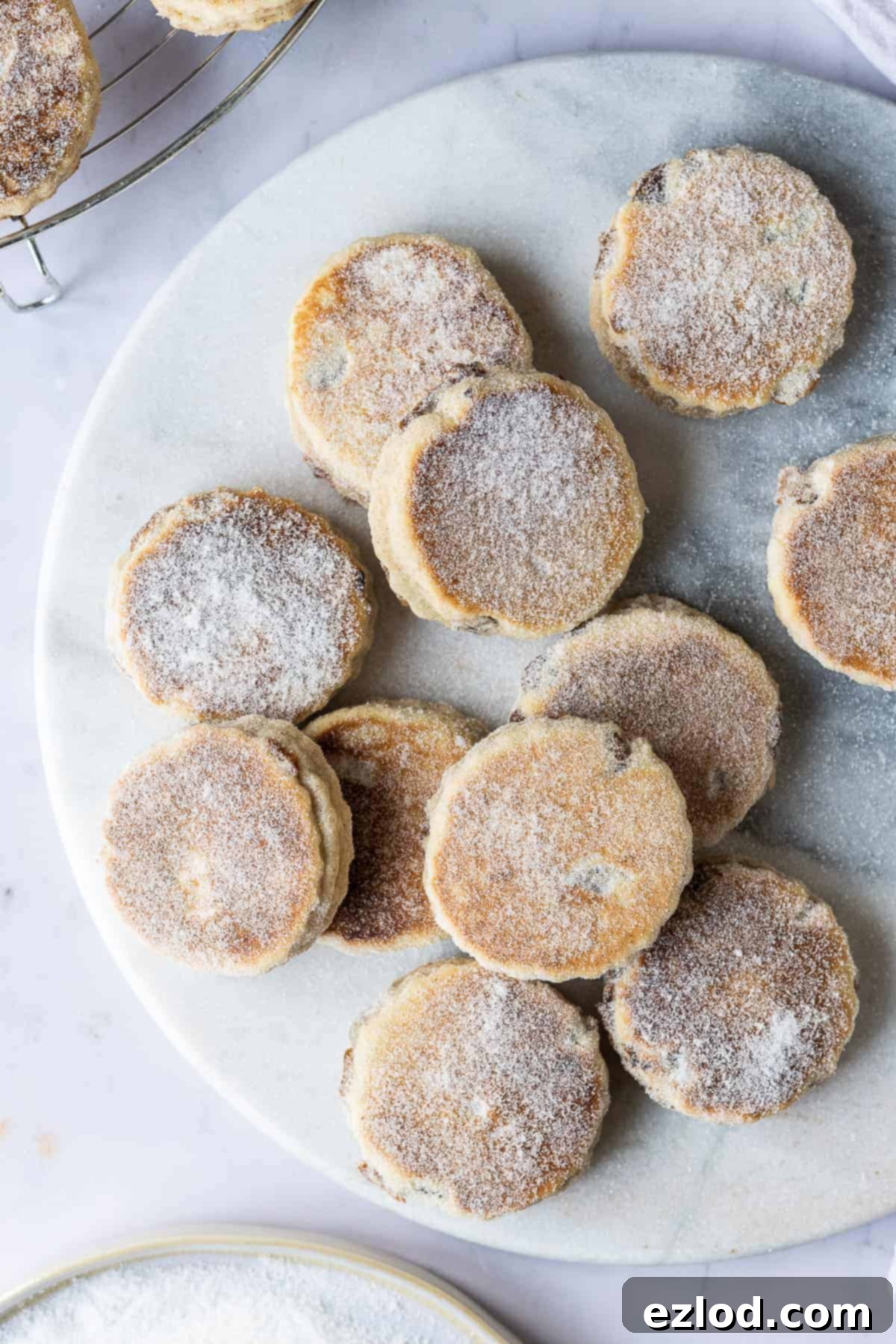
If you tried this recipe why not tag @domestic_gothess on Instagram and hashtag it #domesticgothess
*All images and content on Domestic Gothess are copyright protected. If you want to share this recipe then please do so by using the share buttons provided. Do not screenshot or post the recipe or content in full.*

Print
Vegan Welsh Cakes
Ingredients
- 225 g (1 ¾ cups + 2 Tbsp) self-raising flour (or plain flour plus 1 tsp baking powder)
- ½ tsp mixed spice (pumpkin spice)
- 110 g (4oz / ½ cup) vegan block butter (I use Naturli Vegan Block or Stork block) cold and cubed
- 85 g (⅓ cup + 1 Tbsp) caster (superfine) sugar plus extra for dusting
- 65 g (2 ⅓ oz) sultanas or currants
- 2-4 Tbsp non-dairy milk
Instructions
-
Place the flour and mixed spice (and baking powder if using plain flour) in a bowl and stir to combine.
-
Add the cold cubed butter and rub in using your fingertips until the mixture resembles fine breadcrumbs and no lumps of fat remain.
-
Add the sugar and sultanas or currants and stir through.
-
Gradually stir in enough milk to bring the mixture together into a ball of dough. Be careful not to add too much, it should be soft but not sticky.
-
Roll out the dough on a lightly floured surface until it is about 5mm/¼in thick. Cut it into rounds using a 6.5cm/2 ½in to 7.5cm/3in fluted cutter.
-
Bring the scraps together gently and roll out again to cut out more rounds.
-
Place a cast iron griddle or heavy bottomed frying pan over a low-medium heat and brush with a small amount of butter. Place some caster sugar in a bowl for dusting.
-
Cook a few Welsh cakes at a time until golden, about 3 minutes. Then carefully flip them over and cook for about 3 minutes more until golden on both sides and cooked through. They firm up as they cool. Keep a close eye on them, they can go from golden to burnt very quickly!
-
It can be tricky to get the pan to the right temperature so it is a good idea to cook a test cake first to make sure it’s not too hot.
-
Once the Welsh cakes are cooked, roll them in the caster sugar while still hot and repeat with the rest of the cakes.
Notes
- For the best results make sure that you follow the recipe closely. As always, I highly recommend using the gram measurements (with a digital scale), rather than the cup conversions. Cup measurements are simply not accurate enough for baking and I cannot guarantee the best results if you use them.
- You ideally want to use a block butter or margarine, not the spreadable kind in a tub as it has too high a water content. I use Naturli Vegan Block but Stork block, Vitalite block or Tormor block will all work. In the US Earth Balance Buttery Sticks would be the right kind of product to use.
- You can swap the butter for solid coconut oil but the flavour won’t be as good and you will need to use a bit less – 85 grams rather than 110.
- Make sure that you don’t over-work the dough as that can make the Welsh cakes tough. Just mix it enough to form a smooth dough, don’t knead it.
- Getting the temperature of the pan right is the key to making good Welsh cakes and it may take some experimentation. It needs to be hot enough to cook them through, but not so hot that they burn. It is a good idea to cook a couple of ‘test’ ones first to establish the correct temperature before cooking the rest.
- Recipe adapted from: https://www.bbc.co.uk/food/recipes/welshcakes_67264
